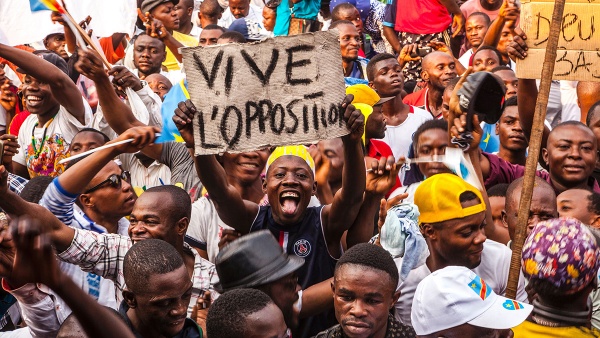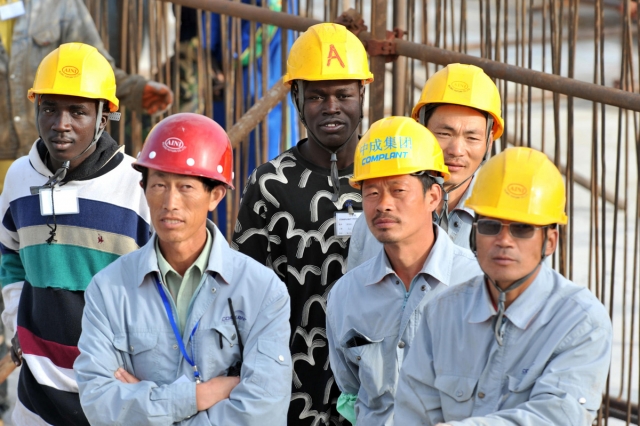
I get lots of internal Oxfam emails. Some of them I even read. Here’s a particularly useful 2019 curtain raiser from Apollos Nwafor, our Pan African Director:
‘There are several issues that put Africa in focus this year:
Reform at the African Union: The reforms agreed by the heads of state at the extraordinary meeting in November 2018 highlight a shift in the political governance and funding of the AU. The reduction in the commission’s leadership to 6 and the commitment to retaining Africa’s top talent, gender parity, accountable and effective leadership as well as transparency raises the hope that we will begin to see more progressive policies that are pro-poor and deliver better for the continent. This is further strengthened by the financing reforms, which will see the AU being financed by its member states rather than by external aid agencies.
Economy: The dismal performance of some of Africa’s largest economies in 2018 does not inspire confidence for this year. Nigeria has endured a questionable slow recovery from a recession caused by falling oil prices, as has Angola. South Africa entered recession for the first time in a decade. However, the year countries like Ethiopia, Rwanda and Ivory Coast achieved growth of over 4% in 2018 promise to become more inclusive in sectors such as health and education. We look towards seeing more mid-economies rise this year, with most of them within West and Southern Africa. As economies grow, it is remains important that we continue to advocate for inclusive economic growth and that African countries prioritize the effective utilisation of its domestic resources to deliver for its citizens.

Politics and democratic governance: More than a dozen national elections will be held across Africa in 2019. Africa’s democracy is facing some of its biggest tests. Countries to watch are Nigeria, Tunisia, Guinea Bissau, Libya and South Africa. They present hot spots for possible unrest and election-related violence, which will have a particular impact on women and girls. This year has begun with tensions and pockets of violence in DRC due to the elections. Sadly, it is aggravating the already fragile situation in the country from the Ebola outbreak, which is increasing despite efforts by external aid agencies including Oxfam. There are reports that in Eastern Congo, one of the most notorious armed groups has increased its acts of use of rape and sexual violence against women and girls – a report which the government has denied. As I was writing this, the electoral commission has just declared Felix Tshisekedi as the winner of the 2018 elections but the Catholic Church and some observers have challenged the results, raising tensions and possible outbreaks of violence. In the past few days there was a failed coup attempt in Gabon, reflecting the growing unrest within the country.
As elections are part of the democratic process, they also present an opportunity to improve Africa’s dream of self-reliance, peace and inclusive democratic governance. This further raises the call for strengthening civic space, human and peoples’ rights in the continent. Our role as facilitators and conveners cannot be overemphasised here.
There are ongoing political reforms in a number of countries across the continent. These include possible constitutional reforms in Kenya, Uganda, Senegal, Cameroun and the referendum in Libya. In Ethiopia, the political reforms are revolutionary and breath-taking in nature putting the ruling coalition under strain. It is one country to watch this year given its leading role in fighting Al-shabab and its strategic role in IGAD and the South Sudan peace process. But the Inter-communal tensions that have been flaring in Ethiopia since 2017 and the increasing demand for autonomy by the sub-regions raise lots of concerns.
Peace and Security: While there were concerted efforts to bring peace to South Sudan in 2018, there seems to be donor fatigue for the process, after at least 6 failed peace deals – the current deal has very little to show so far in terms of implementation. South Sudan remains one of our key focus areas in 2019 as we engage with Civil Society organisations in the country advocating for inclusive peace. In Nigeria, the tension between the locals in the oil rich Nigeria Delta and the federal government has increased over the government’s failure to fulfil its promise to clean up the oil pollution and increase social investments and infrastructure in the region. This is in addition to the ongoing Boko Haram terror. Ethiopia has had pockets of violence and conflicts over land in 2017, which have not abated. The situation in Somalia seems to have taken a new turn, with the government declaring the UN Secretary General’s special envoy Nicholas Haysom persona non-grata, accusing him of interfering in the internal affairs of the country. Other hotspots in 2019 include Cameroun, South Africa, Gabon, DRC and Mozambique, all of which we will continue to monitor closely.
Civic Space: The increase in the number of laws and policies closing and shifting civic space remains a huge threat to voice and public accountability. The ongoing clamp down on fundamental rights and freedom of association and expression in Nigeria, Niger, Uganda, Mozambique, Cameroun and Rwanda, as well as the upcoming elections in at least 12 countries this year, raises the need for a continuous engagement in existing space and creating new spaces (formal and informal).

BRICS– China continues to spread its tentacles across the Continent and this continues to be a cause for concern. In September 2018, the Chinese President pledged $60 billion in financing for projects in Africa in the form of assistance, investment and loans and this has raised fears of ‘neo-colonialism’. African citizens from across the continent have begun to question the sudden ‘interest’ in Africa by China and other BRICS countries. This call for action and a demand for information from citizens is a driver for change. African states must begin to disclose to their citizens pertinent information regarding Trade and Infrastructure agreements and Funding that they are receiving from the BRICS. There is an opportunity to analyse the existing data and develop information that African citizens can utilise to demand changes from their Governments.
Africa’s rising debt: As of last year, Africa’s external debt stock stood at US$524 billion (this excludes Northern Africa, which is about US$151 billion). The debt profile is alarming especially as these amounts do not include Chinese debt, which stands at US$154 billion and is growing at alarming rates. As at 2018, China became the single largest financer of infrastructure in Africa surpassing the African Development Bank, EU, World Bank and G8 countries combined. Chad, Eritrea, Mozambique, Congo Republic, South Sudan and Zimbabwe were considered to be in debt distress at the end of 2018 while Zambia and Ethiopia were downgraded to “high risk of debt distress”. This risks higher levels of inequality and poverty without any strong and realistic plan for economic recovery and growth.
While these challenges are worrying, they present an opportunity for us to rethink our role and approach to fighting poverty and injustice in the continent. We are very hopeful that with everyone on board including our partners and allies, we will make a significant contribution to addressing these issues.‘